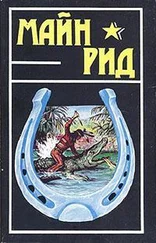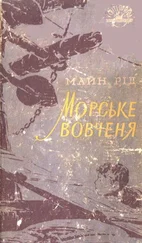These are not directed towards the man who has testified; but against him who stands before them, now presumptively charged with a double crime: the assassination of a son – the defilement of a daughter!
A groan had been heard as the terrible testimony proceeded. It came from a man of more than middle age – of sad subdued aspect – whom all knew to be the father of both these unfortunates.
But the eyes of the spectators dwell not on him. They look beyond, to a curtained calèche , in which is seen seated a lady: so fair, as long before to have fixed their attention.
Strange are the glances turned upon her; strange, though not inexplicable: for it is Louise Poindexter who occupies the carriage.
Is she there of her own accord – by her own free will?
So runs the inquiry around, and the whispered reflections that follow it.
There is not much time allowed them for speculation. They have their answer in the crier’s voice, heard pronouncing the name —
“Louise Poindexter!”
Calhoun has kept his word.
Chapter 88 An Unwilling Witness
Before the monotonous summons has been three times repeated, the lady is seen descending the steps of her carriage.
Conducted by an officer of the Court, she takes her stand on the spot set apart for the witnesses.
Without flinching – apparently without fear – she faces towards the Court.
All eyes are upon her: some interrogatively; a few, perhaps, in scorn: but many in admiration – that secret approval which female loveliness exacts, even when allied with guilt!
One regards her with an expression different from the rest: a look of tenderest passion, dashed with an almost imperceptible distrust.
It is the prisoner himself. From him her eyes are averted as from everybody else.
Only one man she appears to think worthy of her attention – he who has just forsaken the stand she occupies. She looks at Calhoun, her own cousin – as though with her eyes she would kill him.
Cowering under the glance, he slinks back, until the crowd conceals him from her sight.
“Where were you, Miss Poindexter, on the night when your brother was last seen?”
The question is put by the State counsellor.
“At home, – in my father’s house.”
“May I ask, if on that night you went into the garden?”
“I did.”
“Perhaps you will be good enough to inform the Court at what hour?”
“At the hour of midnight – if I rightly remember.”
“Were you alone?”
“Not all the time.”
“Part of it there was some one with you?”
“There was.”
“Judging by your frankness, Miss Poindexter, you will not refuse to inform the Court who that person was?”
“Certainly not.”
“May I ask the name of the individual?”
“There was more than one. My brother was there.”
“But before your brother came upon the ground, was there not some one else in your company?”
“There was.”
“It is his name we wish you to give. I hope you will not withhold it.”
“Why should I? You are welcome to know that the gentleman, who was with me, was Mr Maurice Gerald.”
The answer causes surprise, and something more. There is a show of scorn, not unmixed with indignation.
There is one on whom it produces a very different effect – the prisoner at the bar – who looks more triumphant than any of his accusers!
“May I ask if this meeting was accidental, or by appointment?”
“By appointment.”
“It is a delicate question, Miss Poindexter; you will pardon me for putting it – in the execution of my duty: – What was the nature – the object I should rather term it – of this appointment?”
The witness hesitates to make answer.
Only for an instant. Braising herself from the stooping attitude she has hitherto held, and casting a careless glance upon the faces around her, she replies —
“Motive, or object, it is all the same. I have no intention to conceal it. I went into the garden to meet the man I loved – whom I still love, though he stands before you an accused criminal! Now, sir, I hope you are satisfied?”
“Not quite,” continues the prosecuting counsel, unmoved by the murmurs heard around him; “I must ask you another question, Miss Poindexter. The course I am about to take, though a little irregular, will save the time of the Court; and I think no one will object to it. You have heard what has been said by the witness who preceded you. Is it true that your brother parted in anger with the prisoner at the bar?”
“Quite true.”
The answer sends a thrill through the crowd – a thrill of indignation. It confirms the story of Calhoun. It establishes the motive of the murder!
The bystanders do not wait for the explanation the witness designs to give. There is a cry of “Hang – hang him!” and, along with it, a demonstration for this to be done without staying for the verdict of the jury, “Order in the Court!” cries the judge, taking the cigar from between his teeth, and looking authoritatively around him.
“My brother did not follow him in anger ,” pursues the witness, without being further questioned. “He had forgiven Mr Gerald; and went after to apologise.”
“ I have something to say about that,” interposes Calhoun, disregarding the irregularity of the act; “they quarrelled afterwards . I heard them, from where I was standing on the top of the house.”
“Mr Calhoun!” cries the judge rebukingly; “if the counsel for the prosecution desire it, you can be put in the box again. Meanwhile, sir, you will please not interrupt the proceedings.”
After a few more questions, eliciting answers explanatory of what she has last alleged, the lady is relieved from her embarrassing situation.
She goes back to her carriage with a cold heaviness at her heart: for she has become conscious that, by telling the truth, she has damaged the cause of him she intended to serve. Her own too: for in passing through the crowd she does not fail to perceive eyes turned upon her, that regard her with an expression too closely resembling contempt!
The “chivalry” is offended by her condescension; the morality shocked by her free confession of that midnight meeting; to say nought of the envy felt for the bonne fortune [380] of him who has been so daringly endorsed.
Calhoun is once more called to the stand; and by some additional perjury, strengthens the antipathy already felt for the accused. Every word is a lie; but his statements appear too plausible to be fabrications.
Again breaks forth the clamour of the crowd. Again is heard the cry, “Hang!” – this time more vociferous, more earnest, than ever.
This time, too, the action is more violent. Men strip off their coats, and fling their hats into the air. The women in the waggons – and even those of gentle strain in the carriages – seem, to share the frenzied spite against the prisoner – all save that one, who sits screened behind the curtain.
She too shows indignation; but from a different cause. If she trembles at the commotion, it is not through fear; but from the bitter consciousness that she has herself assisted in stirring it up. In this dark hour she remembers the significant speech of Calhoun: that from her own lips were to come the words that would prove Maurice Gerald a murderer!
The clamour continues, increasing in earnestness. There are things said aloud – insinuations against the accused – designed to inflame the passions of the assembly; and each moment the outcry grows fiercer and more virulent.
Judge Roberts – the name of him who presides – is in peril of being deposed; to be succeeded by the lawless Lynch!
Читать дальше
Конец ознакомительного отрывка
Купить книгу











